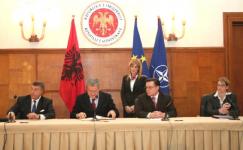 The International Monetary Fund, IMF, ended its mission to Albania on Thursday after monitoring its economy for 17 years, its departure criticised as premature by economic experts and the opposition.
The International Monetary Fund, IMF, ended its mission to Albania on Thursday after monitoring its economy for 17 years, its departure criticised as premature by economic experts and the opposition.
Prime Minister Sali Berisha described the end of the IMF mission as the end of post-communist transition for the Albania’s economy.
“This is the end of the transition of what used to be one of the most centralized economies in Europe and in the world,” said Berisha. “For a democratic country, there is nothing more important than a solid market economy, and now Albania can move forward on its own feet.”
Minister of Finance Ridvan Bode said “Albanian institutions have achieved the necessary maturity to manage the country’s finances”.
However, the decision not to renew the IMF’s tenure in Tirana was cricitised by the opposition, who been quick to accuse the Prime Minister and the Minister of Finance of arrogance and irresponsibility.
Experts fear the government’s populist policies could undermine tight fiscal discipline. In its yearly report on Albania for this year, the IMF remarked on that danger, noting that “popular politics is the main risk to Albanian macroeconomic stability”.
According to Selim Belortaja, head of the Albanian Center for International Trade, politicians don’t yet show responsibility when it comes to public spending, while financial institutions are not yet prepared to act independently.
“Albania has only enjoyed financial stability because behind any government decision there was an IMF official,” Belortaja told Balkan Insight in an interview late last year.
Officials have already started to bicker about growth numbers. Earlier this week, Albania’s Finance Minister rejected an economic growth projection given by the state statistics institute, but found himself rebuked by the Prime Minister.
The statistics institute INSTAT projected that Albania registered a record high Gross Domestic Product growth of 9.9 percent in the last four quarters ending September 30. Finance Minister Ridvan Bode said that the INSTAT projection was only for a quarter, while growth for the year was between 6.0 and 7.0 percent of GDP.
Bode was later rebuked by Premier Sali Berisha, who said the Finance Ministry was not talking about the real numbers. But the IMF head of mission in Tirana, Ann Margaret Westin, rejected Berisha’s claim of double-digit growth.
“We believe that growth is within our projection of 6 per cent of GDP,” said Westin.
However, even Westin was chastised by Berisha, who said he believed economic growth in the country was being under-evaluated and lashed out at the media for being economically illiterate.
“The problem is that your knowledge of the economy is zero,” Berisha told reporters, adding that they were trying to impose a debate that was not real.
 Eurasia Press & News
Eurasia Press & News
